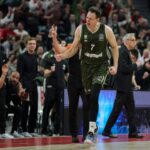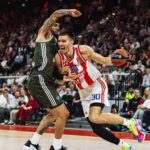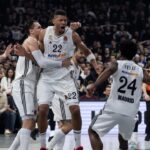Forty-eight Europeans among 432 NBA players: the 11%. This is a percentage everybody, including general managers talking about the superiority of US basketball, has to keep in mind. In 1990, there were six (0.8%) Europeans in the NBA; in 2000, there were 17 (2%). Since pioneers Drazen Petrovic and Arvidas Sabonis, now we have the honor of sending overseas some elements who represent their franchises’ cornerstones: Hedo Turkoglu, Pau Gasol, Tony Parker, Dirk Nowitzki. Even more, trying to summarize their experiences, we can see increased roles, minutes, salaries. How can we explain this huge evolution?
Summarily, the situation first depends on the improved quality of our material, then on the repeated failures of Team USA at the last World Championships and Olympic Games (thanks God there were the best interpreters in Bejing, if still the wrong coach), that has the Americans thinking: “Hey, someone else besides us plays basketball.” You can state it emphatically: In Europe, we play great basketball. But let’s give order to our thoughts – sorry, our convictions.
The NBA Draft can help us in this way; so word to the numbers:
1980-1984: No European players drafted.
1985: Fernando Martin (2nd round); Georgi Glouchkov (7th).
1986: Arvidas Sabonis (1st round); Augusto Binelli (2nd), Drazen Petrovic (3rd); Aleksandr Volkov (6th), Valeri Tikhonenko (7th).
1987: Theofanis Christodolou (4th); Josè Antonio Montero (5th); Sarunas Marciulonis and Riccardo Morandotti (6th); Franjo Arapovic (7th).
1988: None drafted.
1989: Vlade Divac (1st); Dino Radja (2nd).
1990: Toni Kukoc and Stefano Rusconi (2nd).
Please pay attention to these statistics: The 1984 NBA Draft was made up of 10 rounds, 22 picks each. 10 x 22 = 220 players. Do you think all those 220 players drafted were better than some European prospect? The answer is NO.
1991: Zan Tabak (2nd).
1992: Predrag Danilovic (2nd).
1993: Gheorghe Muresan (2nd).
1994: Andrei Fetissov and Zeljko Rebraca (2nd).
1995: Jiri Zidek (1st); Dragan Tarlac, Dejan Bodiroga and Eurelijus Zukauskas (2nd).
1996: Predrag Stojakovic, Zydrunas Ilgauskas, Efthimis Rentzias and Martin Muursepp (1st).
1997: Marko Milic, Predrag Drobnjak, Alain Digbeu and Roberto Duenas (2nd).
1998: Dirk Nowitzki, Radoslav Nesterovic, Mirsad Turkcan, Vladimir Stepania (1st); Bruno Sundov (2nd).
1999: Frederic Weis, Andrei Kirilenko (1st); Gordan Giricek (2nd).
In the 1990s, the doesn’t change: Understandable, during MJ’s reign. The last thing NBA needed was a batch of European rookies, when the reflectors of the entire world were focused on one of the most skilled generations (David Robinson, Charles Barkley, Stockton & Malone, Scottie Pippen, etc.) fans had ever seen. But one event put the Europeans under a new light: The 1996 NBA Finals played by Toni Kukoc, when he probably was the best shoulder in helping Jordan win the title and the MVP crown. We can’t say for sure if Kukoc was the reason for the totally new attitude: The point is that the NBA teams began to draft our players – often without any sense or need, and the journeys of young Europeans to US colleges became more frequent (I recall Jasikevicius, Kaukenas, Radojevic).
2000: Jerome Moiso, Hidayet Turkoglu, Dalibor Bagaric, Iakovos Tsakalidis, Primoz Brezec (1st); Marko Jaric, Josip Sesar, Igor Rakocevic (2nd).
2001: Pau Gasol, Vladimir Radmanovic, Raul Lopez, Tony Parker (1st); Mehmet Okur, Antonis Fotsis, Robertas Javtokas (2nd).
2002: Nikoloz Tsikitishvili, Bostjan Nachbar, Jiri Welsch, Nenad Krstic (1st); Milos Vujanic, Juan Carlos Navarro, Mario Kasun, Peter Fehse, Mladen Sekularac (2nd).
The 2003 NBA draft looks like a paradox: Joe Dumars should apologize for picking Darko Milicic at #2 when Carmelo Anthony, Chris Bosh and Dwyane Wade were still waiting, but also mid-low level players as Szewczckyk, Vranes, Morlende (!), Van de Hare (!!) were drafted before NBA starters like Mo Williams and Steve Blake, and even reliable NBA benchers like Kyle Korver and Willie Green. What trust! So, what’s happened between these ultra-restricted and unlimited epochs for our players? The quality of US players wasn’t on the decline? Was the NBA, which needed to refresh itself, giving due credit to a style of basketball that showed how technical/tactical distances between the US and Europe had shrunk: A grazed nightmare (i.e. Jasikevicius and his missed three-pointer) in the 2000 Olympic semifinals and two delusions in a row (the humiliating 6th place finish in the homemade World Championship, Indianapolis 2002; the 3rd place behind Argentina and Italy in the 2004 Olympics) had taught the Americans something. Consequently:
2004: Andris Biedrins, Pavel Podkolzine, Viktor Khryapa, Sergei Monia, Sasha Vujacic, Beno Udrih (1st); Albert Miralles, Victor Sanikidze, Sergei Lishchuk, Vassilis Spanoulis, Sergei Karaulov (2nd).
2005: Fran Vazquez, Yaroslav Korolev, Johan Petro (1st); Ersan Ilyasova, Roko Ukic, Mile Ilic, Martynas Andriuskevicius, Erazem Lorbek, Mickael Gelabale, Axel Hervelle, Marcin Gortat, Uros Slokar, Cenk Akyol (2nd).
2006: Andrea Bargnani, Thabo Sefolosha, Oleksij Pecherov, Sergio Rodriguez, Joel Freeland (1st); Kosta Perovic, Lior Eliyahu, Vladimir Veremeenko, Yotam Halperin, Eden Bavcic, Loukas Mavrokefalidis, Damir Markota (2nd).
2007: Marco Belinelli, Rudy Fernandez, Petteri Koponen (1st); Kyrylo Fesenko, Stanko Barac, Marc Gasol, Reinaldas Seibutis, Giorgios Printezis, Milovan Rakovic (2nd).
2008: Danilo Gallinari, Alexis Ajinca, Nicolas Batum (1st); Nikola Pekovic, Omer Asik, Ante Tomic, Goran Dragic, Tadja Dragicevic, Semih Erden (2nd).
Nowadays, it’s clear that we have fusion in the NBA.“Come in, Europeans, you’re welcome!” is the message sent by David Stern to our players today. Some connected with it, some don’t. The common feeling is that many players could have get a good career in Europe, instead of warming the NBA pines. But you know, it’s all about the money. Try to explain that concept to Jaric (OK, Adriana Lima counts) and Milicic, for example, whose contracts call for $6.5 million and 7 million, respectively.
The turning point for us was 2004, when the golden generation born in 1979/1980 came of age: Smodis, Vujanic, Navarro, Diamantidis, and Reyes, in addition to 1978-born Vujcic, became top players, carrying the Euroelague to a level we’d never imagined before. More talent was available to be distributed among countries and teams, with the side-effect a careful eye focused on us by the NBA, which is not stupid. It took little time to understand that the renewed Euroleague formula, after the scission between ULEB and FIBA, made it dangerously look like the best league in the world for the intensity, the competition, and the widespread talent. Thus – because business is their religion – we are now overwhelmed by friendly matches in the US and several NBA Europe Live tours.
But the problems are on the table, if people like Navarro and Spanoulis prefer to remain in their countries to act as guiding lights for Barcelona and Panathinaikos, rather than fighting for precious minute in Houston or Memphis. And I imply Greg Buckner isn’t more skilled than Navarro.
The future? It’s not smiling on Stern at all. Euroleague projects are higher and higher, while the NBA’s charm isn’t at its top state (even in the US, it’s overtaken by NFL and MLB). An NBA franchise in Europe? Thanks, we’re not interested in. And the economic effort would surely not be repaid by an audience uninterested in circus lookalike games. Combine the logistics difficulties and the broadcasting problems, and the idea doesn’t suit anybody, here or there.
This is why 5th Avenue in New York City is searching for new markets: It doesn’t matter if their names are China, South America and Iran. The marketers understand Europe could be a giant too strong to pull down. They’re probably hoping for an economic alliance, and the NBA Europe Live tour explains this way of thinking.
However, until the salaries will be a signal so hard to refuse, our best men will land in the USA; but they’ll hesitate much more than in the past, in comparing two worlds so close yet at the same time so different. In considering whether to cross the ocean, they cheer us, for now they think about us, they fear us, they give the Europeans due credit.
The puddle keeps on shrinking.
written by Francesco Cappelletti



